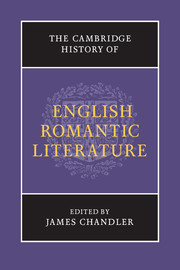Book contents
- Frontmatter
- Introduction
- Part I The Ends of Enlightenment
- 1 Sentiment and sensibility
- 2 Antiquarianism, balladry and the rehabilitation of romance
- 3 The Romantics and the political economists
- 4 The problem of periodization: Enlightenment, Romanticism and the fate of system
- Part II Geographies: The Scenes of Literary Life
- Part III Histories: Writing in the New Movements
- Part IV The Ends of Romanticism
- Chronology
- Bibliographies
- Index
- 1 A New Pocket Map of the Cities of London and Westminster; with the Borough of Southwark, Comprehending the new Buildings and other Alterations, 3rd edn (London: William Faden, 1790).">
- References
4 - The problem of periodization: Enlightenment, Romanticism and the fate of system
from Part I - The Ends of Enlightenment
Published online by Cambridge University Press: 28 May 2009
- Frontmatter
- Introduction
- Part I The Ends of Enlightenment
- 1 Sentiment and sensibility
- 2 Antiquarianism, balladry and the rehabilitation of romance
- 3 The Romantics and the political economists
- 4 The problem of periodization: Enlightenment, Romanticism and the fate of system
- Part II Geographies: The Scenes of Literary Life
- Part III Histories: Writing in the New Movements
- Part IV The Ends of Romanticism
- Chronology
- Bibliographies
- Index
- 1 A New Pocket Map of the Cities of London and Westminster; with the Borough of Southwark, Comprehending the new Buildings and other Alterations, 3rd edn (London: William Faden, 1790).">
- References
Summary
What is Enlightenment?
When Immanuel Kant answered the question ‘What is Enlightenment?’ in 1784, he defined it not only as a philosophical concept but as a particular moment in history. Looking back from the 1780s – over decades of debate regarding reason and religion, scepticism and idealism – he had no trouble naming his period: ‘we do live in an age of enlightenment’. Looking back to the 1780s, however, is another matter. The irony, for us, of Kant’s confident assertion is that he made it at precisely the moment that has since come to mark the start of another age: the period we call Romantic. Kant’s certainty about his own age is now a central uncertainty of our own: the problem of periodization.
Was there a period shift in the late eighteenth century? Do the terms ‘Enlightenment’ and ‘Romanticism’ describe it? The progressive agenda of Enlightenment complicates the confusion. If, for example, history followed the developmental logic of Kant’s vision – he argued that his present ‘age of enlightenment’ would lead to ‘an enlightened age’ – Romanticism as the next period would realize rather than reject what came before. But what we call Romanticism came with its own baggage – claims of difference, of a turn from the past. In that scenario, Romanticism has been either celebrated as a remedy – a cleansing new ‘Spirit of the Age’ – or blamed as a reaction – an emotionally charged retreat from the rational means and ends of Enlightenment.
Keywords
- Type
- Chapter
- Information
- The Cambridge History of English Romantic Literature , pp. 101 - 126Publisher: Cambridge University PressPrint publication year: 2009
References
- 3
- Cited by

